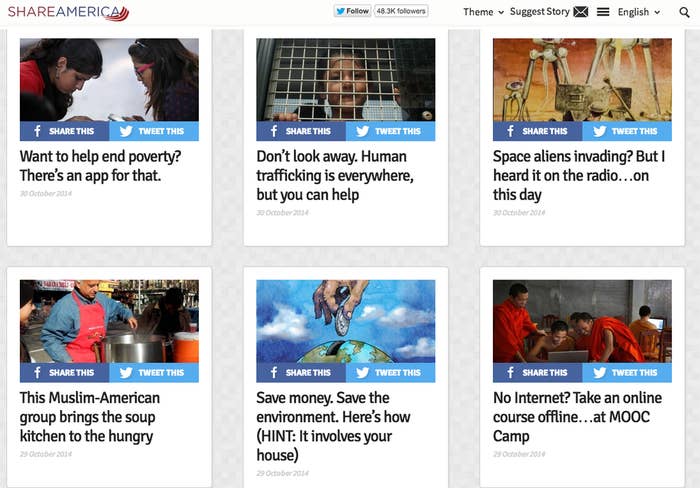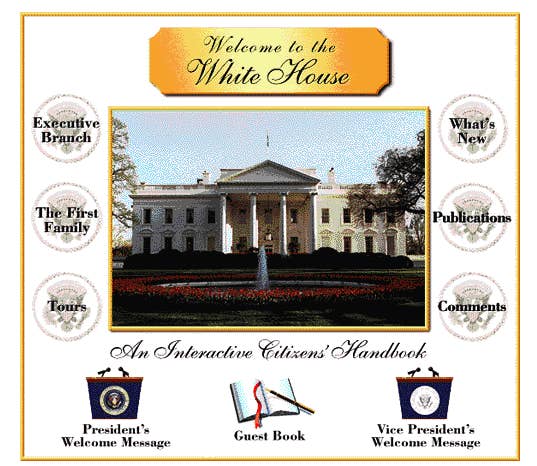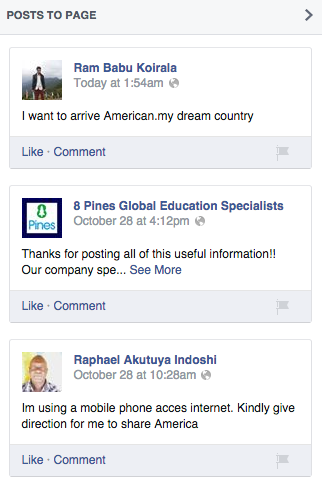
Last week the White House celebrated the 20th anniversary of the launch of its website. To see it now is to be whisked back to 1994, into a pixelated world of noisy clip art and peculiar diversions, such as "Al Gore's Cartoon Gallery."
By today's web design standards it's a hilarious look at the government's attempt to feel out and begin to understand the internet, particularly as a broadcast platform. The relic site, which billed itself as "an interactive citizen's handbook," did its best to mimic the popular web design and content structure of its time; one glance at the 1994 homepage immediately dredges up thoughts of AOL's homepage and "Keywords" pages. Twenty years later, the tools and products are worlds better, but the tactics remain largely the same.

Which is why it's no surprise that the State Department recently launched ShareAmerica, the department's Upworthy clone that's designed "for sharing compelling stories and images that spark discussion and debate on important topics," according to the site's Facebook page.
If you've been online in the past 18 months, you've noticed the undulating traffic successes and failures of Upworthy, Viral Nova, and countless other websites, which discover, package, and optimize stories — often of a political and social advocacy nature — to spread across Facebook and social media. Upworthy, in particular, popularized the style in 2013 with aggressive curiosity gap-style headlines like, "9 Out Of 10 Americans Are Completely Wrong About This Mind-Blowing Fact." For a time, Upworthy, Viral Nova, and a few errant right-wing political clone sites watched as posts garnered millions of views and tens of thousands of Facebook likes and shares.
It's into this viral bog that Macon Phillips, the coordinator of State's Bureau of International Information Programs, wades with the new site. Formerly the White House's director of new media, Phillips created ShareAmerica to promote and repackage content that does everything from educating those interested in immigrating to the U.S. and providing language resources to advancing foreign policy goals.
It's an exceedingly tall order to turn frequently asked visa questions and logistical information about voting in next month's midterm elections into Upworthy-style social hits, but Phillips stresses that, while his site might look like past viral mills, his metrics for success are very different.
"It's important that we're not trying to imitate a site like BuzzFeed or Upworthy and replicate them at State," Phillips tells BuzzFeed News. "I don't have to sell advertising against this, and the drive isn't as much for size of audience as much as it is 'look at the kinds of countries we're getting into.'" To that end, Phillips noted that the site's visitors come from 200 countries, with the top 10 countries creating 60% of all traffic (Mexico, Dominican Republic, Brazil, Philippines, Bolivia, Bangladesh, Colombia, Indonesia, Albania, and the Netherlands).
For a grizzled internet user, a quick tour of ShareAmerica and its social feeds (its Twitter profile has 48.4k followers; its Facebook page has 4,350 fans as of this writing) feels a bit tone-deaf. Headlines like "Top 7 Diversity Visa Questions Answered" and "Save Money. Save The Environment. Here's How (HINT: It involves your house)" feel like square content being forcibly hammered into the social web's round hole. And to some extent that's true. The State Department and its public affairs arm have been accused before of clumsy internet-based initiatives, like "Think Again, Turn Away," a social media campaign intended to thwart online extremism and hostility toward the U.S., which was roundly criticized by media outlets.
But in another light, Phillips' still-new ShareAmerica (the site launched roughly five weeks ago) is part of a time-honored tradition of experimental, government-led forays into the modern web. "Being able to make important but not always exciting information more accessible is something we've been struggling with and challenged by for years," Phillips said. "It's a little bit early for me to tell you that we cracked the code on making boring topics interesting, but we're working on it."
ShareAmerica's staff hasn't yet hired any viral content masterminds, instead opting to draw on the resources of current State Department employees.
"It's really gratifying to work with somebody who's been at State for 30 years, who's put out content that's been seen around the world now use internet to do similar things and find a new source of distribution and creativity for people that aren't 22-year-old, skinny-jean-wearing digital natives good at making content."

To indoctrinate this new breed of policy-savvy, government-employed, viral content maker, the State Department has scheduled "innovation field trips" to media companies like Mashable, Reddit, and HUGE. "Sometimes those trips are about how to make content and sometimes it's, 'Hey guys, here is a company without a bunch of cubes' — it's like, here's different, collaborative work environment that's set to promote creativity," Phillips said.
While the department didn't provide BuzzFeed News with traffic figures and the sharing figures on Twitter and Facebook posts are modest, Phillips suggested that ShareAmerica's metric of success is twofold: getting important information to the right people (most of whom live outside the United States) and introducing an experimental and timely approach to government information sites. Much like the White House's 1994 site acts as a time capsule for the early consumer web, ShareAmerica, whether successful or not, is a funhouse mirror reflection of today's internet — a perhaps humbling, but ultimately admirable attempt to understand the always-shifting content hive of the web.
"We certainly have a lot of room to improve, but the other thing that's important is we're introducing a data-driven culture to rely on data to make new decisions," Phillips said. "It's understanding the takes on topics that end up performing well, and I think that's an approach that you and others who write online can understand."
